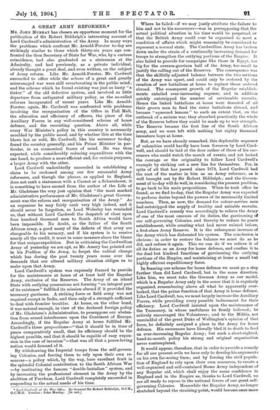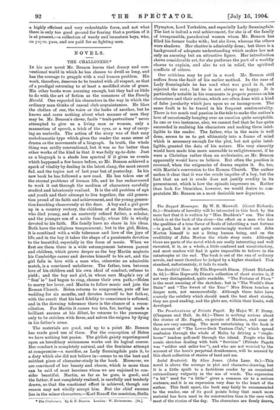MR. JOHN MURRAY has chosen an opportune moment for the
publication of Sir Robert Biddulph's interesting account of Lord Cardwell's administration of the Army. In many ways the problems which confront Mr. Arnold-Forster to-day are strikingly similar to those which thirty-six years ago con- fronted the then Secretary of State for War, who, by a curious coincidence, had also graduated as a statesman at the Admiralty, and had previously, as a private individual, already thought a great deal, and even written, on the subject of Army reform. Like Mr. Arnold-Forster, Mr. Cardwell succeeded to office while the echoes of a great and greatly mismanaged war were still reverberating in the public mind; and the scheme which he found existing was just as hasty "a tinker" of the old defective system, and involved as little departure from antiquated military policy, as the so-called reforms inaugurated of recent years. Like Mr. Arnold- Forster, again, Mr. Cardwell was confronted with problems involving the reorganisation of the Office in Pall Mall,
the education and efficiency of officers, the place of the Auxiliary Forces in any well-considered scheme of home defence, and the recruiting question. Above all, while every War Minister's policy in this country is necessarily moulded by the public mood, and by whether this at the time blows hot or cold, Mr. Cardwell, like his successor to-day, found the country generally, and his Prime Minister in par- ticular, in an economical frame of mind. He was thus expected, while considerably reducing expenditure with the one hand, to produce a more efficient and, for certain purposes, a larger Army with the other.
Lord Cardwell undoubtedly succeeded in establishing a claim to be reckoned among our few successful Army reformers, and though the phrase, as applied to England, does not rank a statesman with a Carnot or a Scharnhorst, it is something to have earned from the author of the Life of Mr. Gladstone the very just opinion that "the most marked administrative performance of Mr. Gladstone's great Govern- ment was the reform and reorganisation of the Army." As an organiser he may fairly rank very high indeed, and it should never be forgotten, as Lord Wolseley has reminded us, that without Lord Cardwell the despatch of close upon four hundred thousand men to South Africa would have been impossible. No doubt, as the father of the South African army, a good many of the defects of that army are chargeable to his memory, and if his system is to receive nearly all the credit, it must in some measure share the blame for that unique expedition. But in criticising the Cardwellian Army of yesterday we are apt, as Mr. Amery has pointed out in his Problem of the Army, to forget the radical change which has during the past twenty years come over the demands that our altered military situation obliges us to make upon that Army.
Lord Cardwell's system was expressly framed to provide for the maintenance at home of at least half the Regular Army, exclusive of the Reserves. The Army of an island State with outlying possessions not forming "an integral part of its existence" fulfilled its mission abroad if it provided the necessary garrisons. A striking force or field army was not required except in India, and then only of a strength sufficient to deal with frontier troubles. At home, on the other hand, it was natural enough, in view of the declared foreign policy of Mr. Gladstone's Administration, to presuppose our absten- tion from armed interference upon the Continent of Europe. Accordingly, if the Regular Army at home fulfilled Mr. Cardwell's three propositions—" that it should be in time of peace comparatively small, that its efficiency should be the highest possible, and that it should be capable of easy expan- sion in the case of invasion "—that was all that a peace-loving nation would demand of it.
By withdrawing the Imperial troops from the self-govern- ing Colonies, and forcing them to rely upon their own re- sources—a policy which, by the way, bore excellent fruit in the splendid Colonial contribution to the South African War —by instituting the famous "double-battalion" system, and by increasing the professional element in the Army by the abolition of Purchase, Lord Cardwell completely succeeded in responding to the actual needs of his time.
• Lord Card-well at the War Office. By General Sir Robert Biddulph, G.C.B., G.C.M.G. London: John Murray. [9a. net.] Where he failed—if we may justly attribute the failure to him and not to his successors—was in presupposing that the actual political situation in his time would be perpetual, or that the British Army could ever be organised to meet a condition of affairs which might reasonably be considered to represent a normal state. The Cardwellian Army has broken down under the strain of a continually increasing demand for troops to strengthen the outlying portions of the Empire. It also failed to provide for campaigns like those in Egypt, too big for the oversea-garrison half of the Army, too small to justify the calling out of the Reserves. The consequence was that the skilfully adjusted balance between the two sections of the Army was upset, and could only be restored by the creation of new battalions at home to replace those ordered abroad. The consequent growth of the Regular establish- ments entailed ever-increasing expense, and in addition quickly outstripped the number of serviceable recruits. Hence the linked battalions at home were denuded of all their grown men to feed the sister battalions abroad, and became "squeezed lemons" to such an extent that, on the outbreak of a serious war, they absorbed practically the whole of the Reserve before they could be made up to war strength. The Reserve became the first line of the South African army, and we were left with nothing but eighty thousand immature boys at home.
But, as we have already remarked, this deplorable sequence of calamities could hardly have been foreseen by Lord Card- well, and should be laid at the door rather of those of his suc- cessors who could watch the march of events, and yet lacked the courage or the originality to follow Lord Cardwell's example by striking out a new line for themselves. For, in spite of all that has passed since 1874, Lord Cardwell had the root of the matter in him as an Army reformer, as is well brought out by Sir Robert Biddulph ; and the Govern- ment of to-day will do well, in considering the present problem, to go back to his main propositions. When he took office he found, as we find to-day, that the Regular Army was expected to perform duties beyond the powers of its necessarily limited numbers. Then, as now, the demand for colour-service men had outstripped the supply of healthy and suitable recruits. Lord Cardwell's remedy was accordingly to relieve the Army of one of the most onerous of its duties, the garrisoning of our self-governing Colonies, and thereby to reduce its peace establishment, while creating what had never existed before, a first-class Army Reserve. It is the subsequent increase of the Army which has dislocated his system. The conclusion is obvious : in order to restore the balance we must do as he did, and reduce it again. This we can do if we relieve it of all its duties as an Army for home defence, and confine it to the dual but kindred functions of garrisoning the outlying portions of the Empire, and maintaining at home a small but highly efficient expeditionary force.
In framing our scheme for home defence we must go a step further than did Lord Cardwell, but in the same direction. Like him, we must take the German Army as our model, which is a Regular Army only in the sense that it is regularly organised, remembering above all what he apparently over- looked, that the prime function of that Army is home defence. Like Lord Cardwell, too, we must largely increase the Auxiliary Forces, while providing every possible inducement for their efficiency. Lord Cardwell insisted upon the maintenance of the Yeomanry, in whose usefulness he firmly believed; he actively encouraged the Volunteers ; and to the Militia, not unmindful of the great Duke of Wellington's opinion of that force, he definitely assigned a place in the Army for home defence. His successors have literally bled it to death to feed an ever-increasing Regular Army; but such a short-sighted, hand-to-mouth policy his strong and original organisation never contemplated.
It would appear, therefore, that in order to provide a remedy for all our present evils we have only to develop his arguments on his own far-seeing lines; and by forcing the civil popula- tion of England to rely upon their own resources, to create a well-organised and self-contained Home Army independent of any Regular aid, which shall enjoy the same confidence in England and in the Empire as, thanks to Lord Cardwell, we are all ready to repose in the national forces of our great self- governing Colonies. Meanwhile the Regular Army, no longer stretched beyond the straining-point, would become once more a highly efficient and very redoubtable force, and not what there is only too good ground for fearing that a portion of it is at present,—a collection of weedy and immature boys, who, on raper, pass, and are paid for as fighting men.



































 Previous page
Previous page